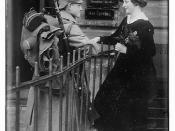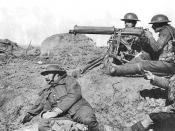Why the First World War lasted so long
The First World War (1914-1918) was a war that lasted substantially longer than anyone anticipated. This was largely due to the technological developments created by the industrial revolution coupled with the sheer scale of the conflict and the huge amount of resources that the two armed sides were willing to commit. The war lasted as long as it did because of the new style of warfare employed and the fact that military leaders of the time were slow to realise the extent of the change warfare had undergone.
The war was the culmination of a chain of events in Europe involving various Empires, the alliances they sought and their desire for power and security. The rivalry created by this caused an intense rush by countries to outdo one another, specifically between the German and British empires. By the.time the war itself started there was a massive technological change underway called the industrial revolution.
This caused many new advances in all fields and a substantial change to the way of life for everyone alive at the time.
A product of this revolution was an arms race that led to the improvement and expansion of armed forces and their equipment. New weaponry was created on both sides of the conflict, some of which were brought in during the later years of the war, not always at the beginning. These new weapons included poison gas, flamethrowers and on a different scale late in the war, tanks. These weapons caused older military tactics to become obsolete and created a style of warfare that had never been seen in the world before.
The most notable weapon to appear was the most deadly weapon of the 20th century, the machine gun. It was designed in America in 1884...

![[German vehicle tax registration issued to George Grantham Bain] (LOC)](https://s.writework.com/uploads/6/60390/german-vehicle-tax-registration-issued-george-grantham-bain-thumb.jpg)
